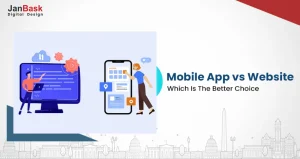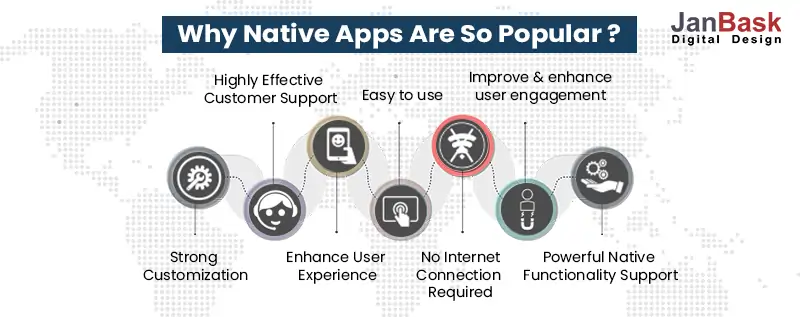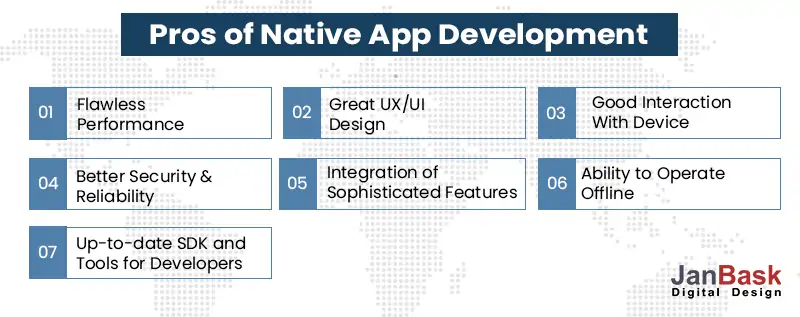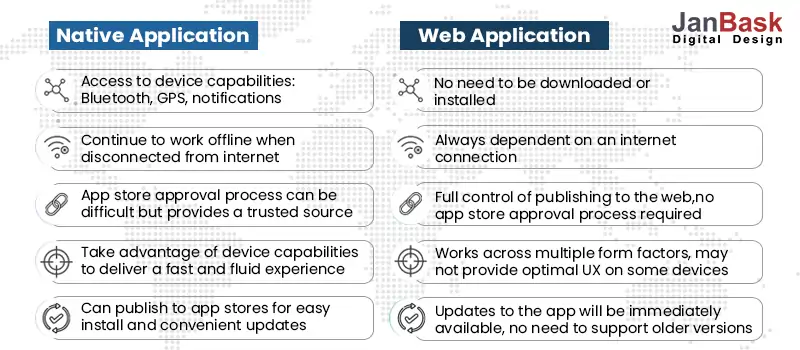
The future of app development is a much-debated topic, with many opinions on the best approach. Native and web apps each have unique advantages, so it is important to consider which option is right for your business before getting started.
In today's digital economy, businesses of all sizes must have a presence on mobile devices in order to stay competitive. Mobile apps provide a wide range of benefits and advantages for businesses, including increased customer engagement and loyalty, improved brand recognition, greater accessibility to customers, higher visibility on app stores and digital marketplaces, and better data tracking and analytics capabilities.
Businesses are turning to mobile app development services for Native apps. They are often the best choice for a mobile platform, as they offer several advantages that other solutions do not. Native apps provide the highest level of performance, with decreased loading time and less latency when compared to web-based or cross-platform apps.
Let’s understand what are native apps and why it’s a better choice!
Looking to Create A Native App For Your Business?

Native Apps are those which are built for a specific platform such as iOS, Android, Windows, and more. If we say that we have built the Native App for the iOS platform, it means that the application can’t run over any other platform like windows or android. Native Apps are mainly designed for mobile devices to facilitate mobile users. Some examples of Native Apps are Global Positioning Systems (GPS) and Camera.

You can get the most out of your device with native app features. It lets you enjoy a smoother, more intuitive user experience that is tailored to your device's specific hardware and software capabilities. Let’s figure out the major competencies:
The code that runs the native app is locally stored on the device, cutting down on the time spent downloading the static content, such as images and text. This enhances the app speed and performance, ensuring faster outcomes.
A native app is asynchronous in nature, which means that dynamic information can be locally stored on the phone for a temporary period of time and synced later with the central server hosted on the web. Native apps are ahead of the web-based apps on this front even if modern technologies and features, like the ones in HTML5, enable this in a web-hosted environment.
When it comes to interesting features, a native app always tops the chart as you can access the hardware features of the platform enabling multi-faceted functionalities like making phone calls to contacts, allowing taking photos, getting hold of GPS information, gaining information from near-field communication (NFC).
Play store and App store put your mobile applications on the map. It is a free shelf space to advertise your app, helping to gain visibility, new users, and engagement. Especially, if the app has got unique features, then it is taken well and promoted to the entire app market, aiding in marketing and distribution. Hosting apps on app stores requires certain guidelines. Hence, releasing a web-based app externally would require a lot of marketing and effort on the owner’s end.
After gaining a substantial understanding of the native app let's look into the benefits of a web-based application.

Other Benefits:
- Enjoy a more immersive user experience with native app UI/UX design.
- Feel secure knowing that your data is safe and secure on native apps.
- Improved customer engagement and loyalty, resulting in increased revenue.
- Increased visibility on app stores, leading to more downloads and users.
- Get the most out of your device with native app features.

According to a study in the latest quarter, the total value of global consumer spending on mobile apps amounted to 33 billion U.S. dollars.
A detailed comparison of native vs. web apps shows that both come with pros and cons. The drawback of one is the upside of the other. The striking difference while developing a native vs web app is that a separate code base is built and maintained specifically for individual platforms. For example, if you want to design an app for both Android and iOS then you have to develop two different versions of the app, one for the Play Store and the other for the App Store.
Whereas, if we take into account web vs native apps, the biggest drawback is the limitation in accessing the hardware features of the devices such as camera, GPS, etc. This is why most app developers today prefer native over web-hosted mobile applications. However, The emergence of new technology cloud and 5G, for example, bringing in new computing power and speed, opening newer possibilities.
Building a native mobile app requires a lot of planning, preparation, and execution. It is important to understand the process fully before beginning the project and ensure that you have the proper resources. The first step is to define your goals and objectives for the application. Ask yourself questions such as why you need this app, and who will benefit from it.
After defining the goals and objectives for a native mobile app, the next step is to create a detailed plan. This plan should include a timeline with milestones and deadlines, as well as required resources. The best way is to reach out to professional mobile app development services that have the required infrastructure and capabilities to deliver what is required.
Moving ahead, we’ll let you also learn about looking into some of the rising trends that rule the future of app development.
Looking to create an MVP of your application? You can do it without depending on the developers. There are multiple no-code app builders available today in the market that help you to set the fundamentals of your app. With an easy drag-and-drop creation, you can quickly build the background of your app. These no-code platforms are here to stay and would run the show in the future.
Ruling technologies like AI along with Machine Learning and Deep Learning is transforming the app space in many ways. Improved algorithms, simulating human behavior, and learning more about the environment in which humans are making decisions are altering the course of action. The right data is helping to create user-specific personalized experiences.
When we talk about AI, we cannot ignore the contribution and need of chatbots. They are designed using AI and Neural Language Processing (NLP) to understand human characteristics. With time and a number of patterns, a bot is trained to casually interact and support users helping in conversational marketing.
Time is of value as we move to the future and enterprise applications will play an important role to make the most of it. Enterprises seek applications today to automate processes so that complex tasks are completed on time. Real-time solutions are demanded to improve the IT processes, workflows and security. Hence, custom enterprise mobility solutions will prove to be a game changer.
Metaverse is doing the buzz now and it is expected to become the new web. There won’t be any web vs native app confusion then as most apps will be developed for the verse. Augmented reality and virtual reality are the two pillars of Metaverse that bring together physical and virtual environments. Hence, AR & VR technology will capture the app development space.
React Native and Swift UI use this programming format known as Declarative Syntax to help developers manage and align complex animations seamlessly into the applications. The future will see its growing popularity making way for faster and smoother app development.
What is a native app?
Native apps are Android or iOS apps that are hosted and available on app stores and not on the web.
What is a web app?
Web apps are designed and developed to be on the web.
Which one is better - native apps vs web apps?
Both have their own pros and cons. While most app development services recommend web apps for a long-term strategy. Native apps have the flexibility of leveraging platform features and functionality over web-based apps.
With the new trends reshaping technology, a new digital era has come into existence. The future of app development is also undergoing significant transformations. The app development services and the market will see positive changes as web technologies continue to be better.
New web development trends will do the rounds and alter the current limitations of web-based applications. The app market will be more fragmented as new mediums such as interactive smart TVs are making their way. More mediums mean more platform technology innovations and a rising need for centralized offerings.
Hence, the ultimate goal is and will always be to create well-orchestrated user experiences. Therefore, the future is not native vs web apps but more about creating connections and joining the dots using technologies.
What are you looking for in terms of app development? Our experts at JanBask Digital Design are able to answer your questions. We can’t wait to learn about your vision or suggestions for building native apps. Please provide our feedback and suggestions in the comments section below!
Interested in our Mobile App Development Services?

S
I recommend you to include in your article the MCSS technology, which looks promising, as it reduces the development time and costs of Native Apps.